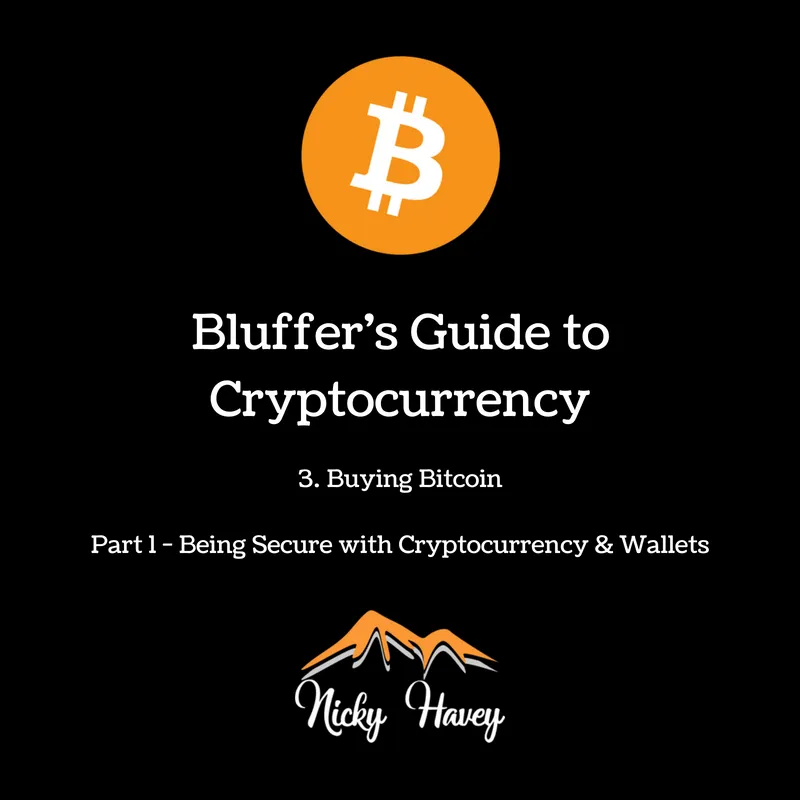
Introduction
Welcome back to The Bluffer's Guide to Cryptocurrency - a layman's approach to understanding Bitcoin and Blockchain Technology!
It's been a while since I last posted for those of you who were interested in finding out more about Bitcoin and cryptocurrency. I apologise, life outside of this sphere has taken over but we're back in action!
If you can remember that far back, the last blog went through some of the other types of consensus methods used to power blockchain technology. You can read about it here.
Now we have a bit more of an understanding of how blockchain works, we will move into a new chapter of the guide - "Buying Bitcoin" - how do we actually get our (digital) hands on this stuff?
This chapter will go through how to be secure online, what wallets are and how they work.
You may have read some horror stories in the past about people losing millions on exchanges so I'll aim to give you a little bit of awareness before making your own decision about whether or not to get in the cryptosphere.

Before I begin, I want to emphasise that this is a highly simplified version of what I have learnt from my own research and I'm sharing my learning with you. If you do know this topic inside out, be nice to those who are still learning about this (myself included) and we can grow together.
Furthermore, this is not financial advice and I am not a financial advisor. I am a crypto-enthusiast and want to create a guide to help total beginners understand what this is all about. Please seek financial advice from a qualified professional if you have any doubt about how to spend your money.
So with that said, brace yourselves, you might learn something! Shall we begin?
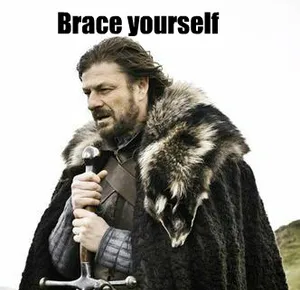
How can you be secure online with cryptocurrencies?
That is a good question, and one I get asked frequently as the word "cryptocurrencies" has a scary ring to it for most, it sounds mysterious, like it's another part of the internet, the "dark side" if you will. This viewpoint probably isn't helped by some news stories from mainstream outlets reporting that it's only used by criminals. To put your mind at rest, less than 1% of all Bitcoin transactions have been used for illicit activity according to this report.
Of course, I encourage you to be diligent in your research and don't just take my word for it.
Anyway, going back to online security, some quick tips are below but there are many good practices you should be doing daily in your online ventures.
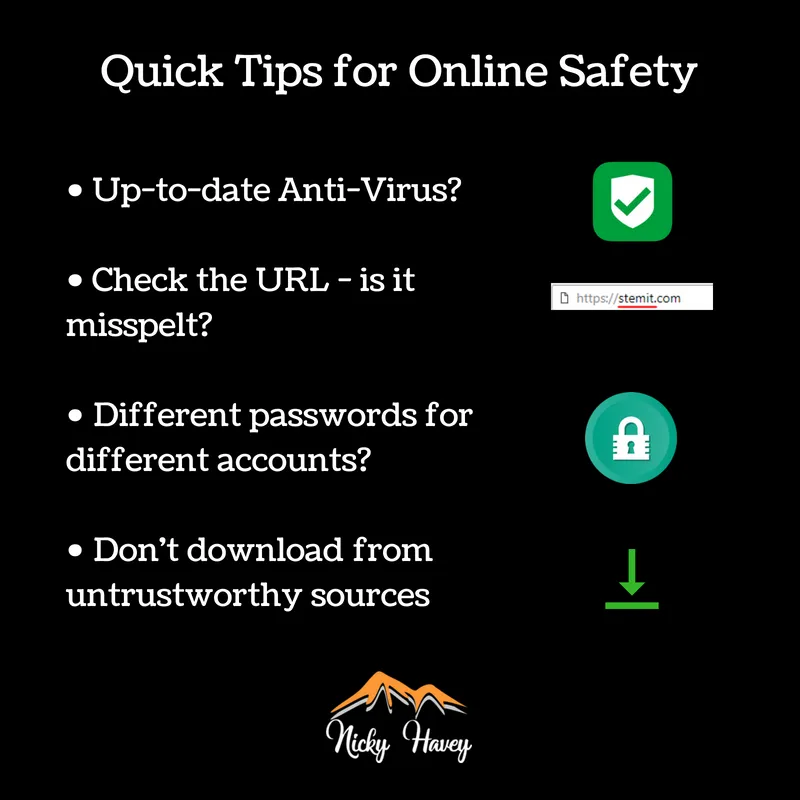
Once you have mastered safe internet browsing, you have a great mindset for being safe and vigilant with your cryptocurrency venture.
As we progress through this chapter, I will be highlighting what to look out for to make sure you are well equipped when setting things up, such as your "wallet".
What is a wallet?
In the physical world, a wallet is a place where you store your money (coins, cash, cards etc.). Guess what? In the crypto world, a wallet is also a place where you store your money, except it's all 0s and 1s rather than physical items. But then again, if you bank online, it's all numbers in a system anyway.
Now there are a couple of things you need to be very wary of when it comes to your wallet, mostly your private key and your public address.
What are private keys and public addresses?
The "public address" is like your sort code and bank account number for fiat banking and it usually consists of multiple letters and numbers. This is what you use to receive funds from whoever so people know where to send your money.
"Private keys" are for your eyes only! These are like your log in information to get in to your bank account or PIN for debit/credit cards so DO NOT share this at all with anyone! This can come in the form of a 24 word sequence, which you should write down multiple times and store in a safe place, or as a long sequence of letters and numbers. If you lose them, you lose everything that's in your wallet so it's very important you keep this information!
Not only that but if someone else gets hold of this information, then they can withdraw whatever amount you have in your wallet and there's no way to retrieve it. This is decentralised finance remember, the onus is on you to look after it!
Each cryptocurrency has its own way of doing things with setting up wallets so it would be impossible to cover all of them but they each have a variation of public addresses and private keys.
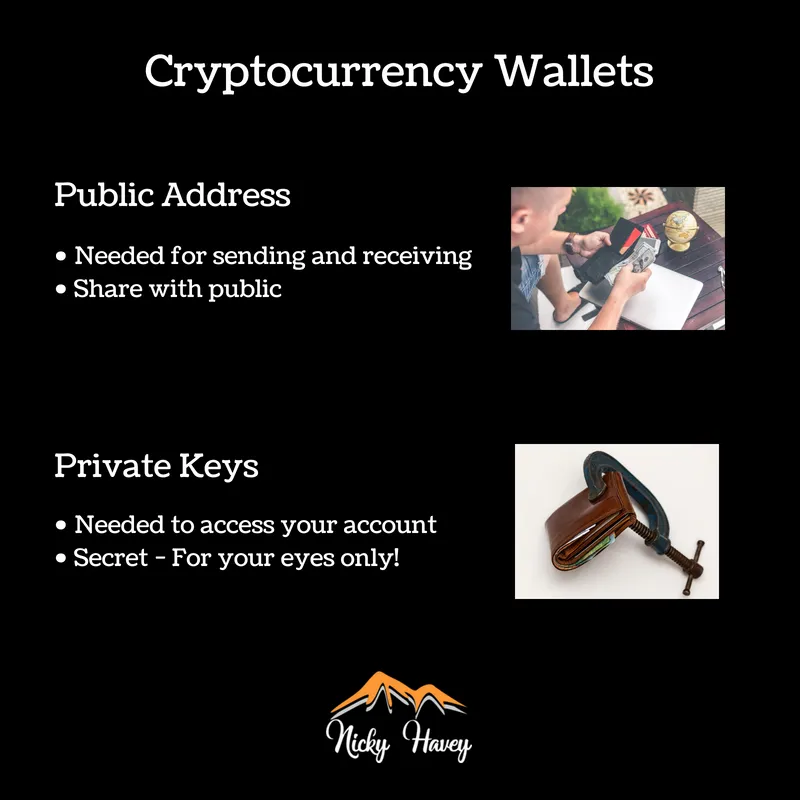
How can I send cryptocurrency?
Sending cryptocurrency is not too dissimilar to receiving it. Again, you will need the PUBLIC ADDRESS of the recipient's wallet, type in the amount to send, any memo/reference for the payment and away you go.
Please note that the wallet you are sending to needs to be the cryptocurrency you are sending. So if you want to send Bitcoin to someone, you will need their Bitcoin wallet address. You can't send Bitcoin to an Ethereum wallet for example and you will lose whatever you send to the ether (no pun intended). Therefore please ensure you are sending and receiving in the same cryptocurrency!
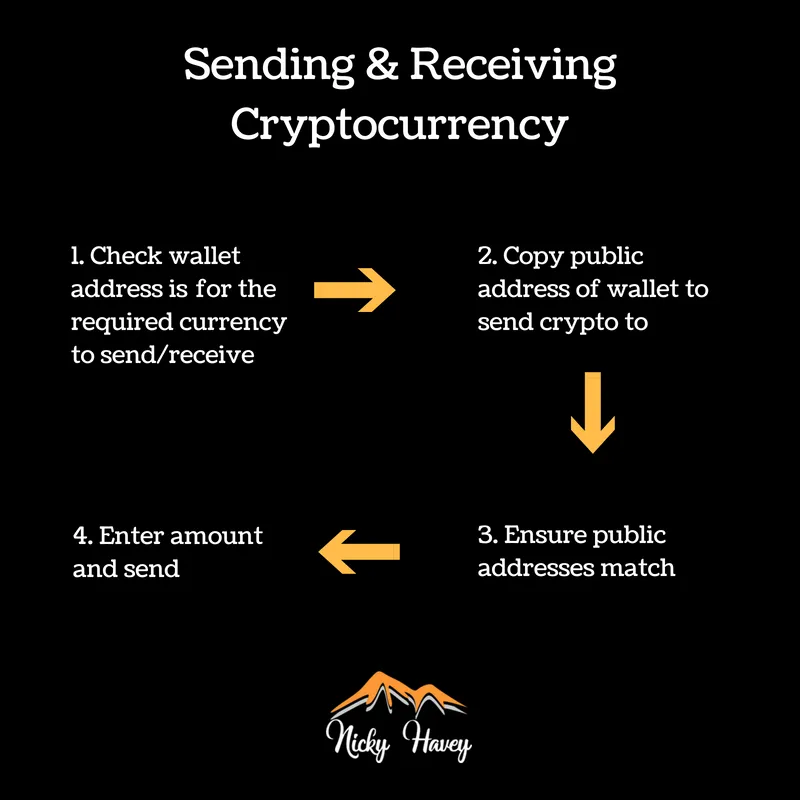
Wallet 101
I'll say it again because it is worth repeating:
DO NOT LOSE OR GIVE ANYONE YOUR PRIVATE KEYS, NO MATTER WHAT!
I've seen some horror stories in the mainstream media about people who have given their private keys to scammers pretending to be investment bankers/financial advisors with the promise of "doubling up" or "30% returns in a week". Guess what happened?
Be savvy, do your homework, make an informed decision about your money and remember, DO NOT LOSE OR GIVE ANYONE YOUR PRIVATE KEYS!!
Phishing
I'm not talking about your latest catch here but rather the online scam known as phishing, whereby fraudsters will try to steal usernames, passwords and other personal details for malicious purposes.
As mentioned earlier, always check URL (website) spellings, ensure that the public addresses you use to send and receive match EXACTLY otherwise it will get sent to some unsuspecting (but probably grateful) randomer.
Different wallets?
As if you didn't have enough to think about, there are various different wallet "types" you can use for sending, receiving and storing cryptocurrency.
Hardware Wallets
These are effectively an encrypted USB stick, mnemonic if you will, which keep your private keys locked away inside of it. There's still a 24 word sequence ("seed") which you will need to write down to recover your wallets if the stick becomes damaged or you lose it. So, you can lose the stick, but don't lose the 24 word phrase!
Hardware wallets are very secure to store your cryptocurrencies, often referred to as "cold storage" because you can unplug them from your computer and keep them out of the reaches of online criminals. Yes, they cost money but it's a one-off fee (if you look after it) and it's my preferred method of storing coins.
If you are going to buy a hardware wallet, only buy it from the manufacturer directly. Amazon and eBay are big no-nos when it comes to this.
There are a couple of manufactures out there but I've been using the Ledger Nano S to good effect and found it really easy to use. The website has a plethora of useful tutorials which I went through to understand how it works and it has integrated a lot of cryptocurrencies, with more being added regularly.
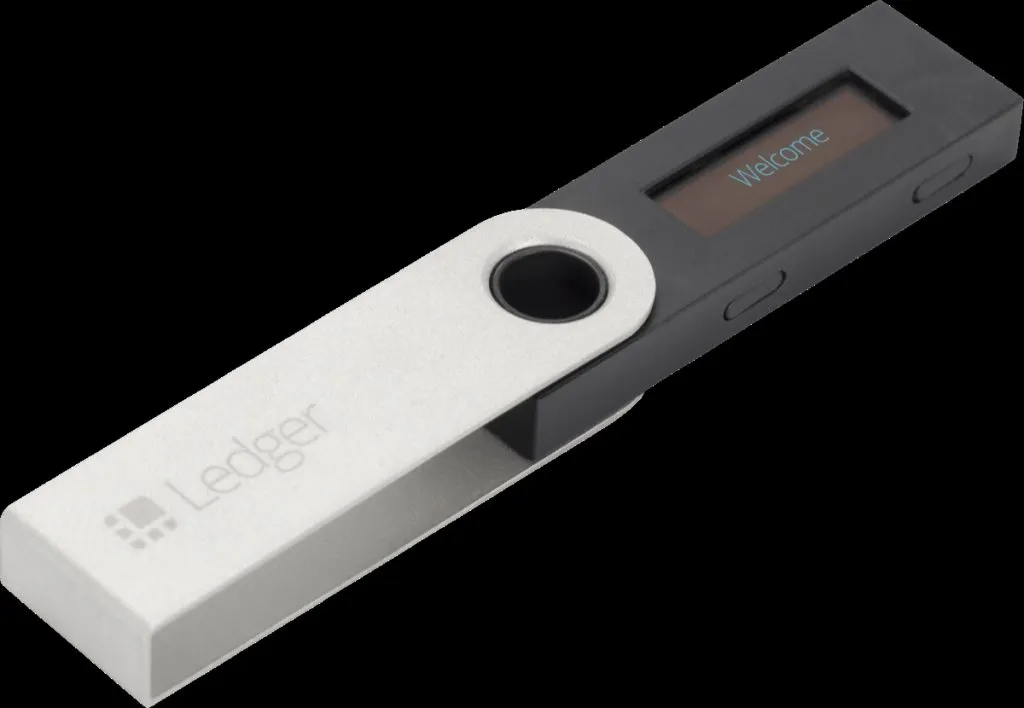
Paper Wallets
As the name suggests, this is a printed sheet of paper with your wallet information on (public address and private keys) specific to the cryptocurrency. You would just need to manually type out the public address from the sheet of paper to send and receive funds (remember, NOT the private keys).
Again, this method is mainly for "cold storage" of coins but it's a safe way of keeping your money away from those pesky online threats. I don't remember hearing of a piece of paper being hacked but as safe as a sheet of paper is from online shenanigans, you need to keep it in a safe place and make sure it's still in a "readable" condition for when you want to send and receive coins as paper does deteriorate, catch fire, get eaten by dogs etc.
"How do you create a paper wallet?" I hear you ask. Well, I created one from this website - Wallet Generator and followed the steps there but there are other methods out there and suggest you do your own research on that. I clicked the link, then disconnected from the internet with the webpage still open, selected the appropriate cryptocurrency and took it from there. You can either print off the whole paper wallet from this site or copy and paste the public address and private keys in to a word document and print off (as long as you delete the word document after).
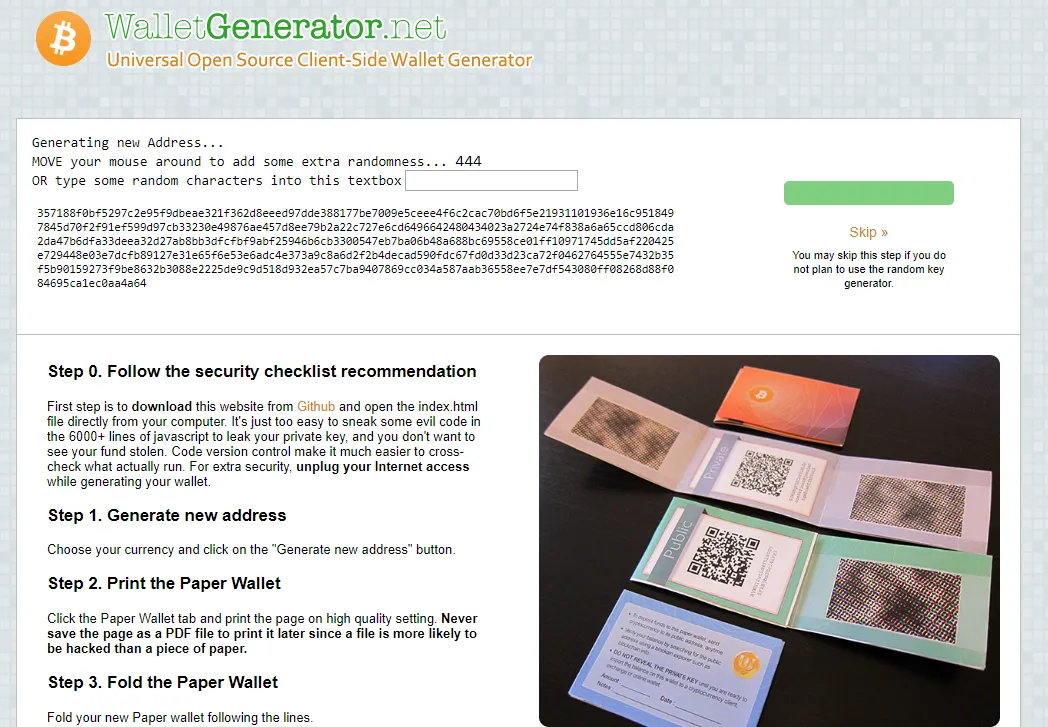
You can then check your wallet account by going to this site - Blockchain Explorer and typing in your wallet's public address.
Online Wallets
These are the least secure of the 3 types of wallets simply because they are online and prone to attack. Online wallets, also called "hot wallets/storage", are usually on exchanges or the website from where you got your currency from. The reason they are higher risk is because if hackers break in to the exchange or website, they will have access to all the funds from everyone on the site.
You will probably have heard of hacks of exchanges in the news where many millions have been stolen, which begs the question, "Why store your currency in a so-called hot wallet?"
Well, despite the risk, you can quickly transfer funds around on exchanges rather than having them on cold storage, offering a bit more liquidity and 2 Factor Authentication is a must when setting up an account so you can at least double the security of your transactions. This approach is more for those into their day trading but for me, I try to stay away from hot wallets as best I can.
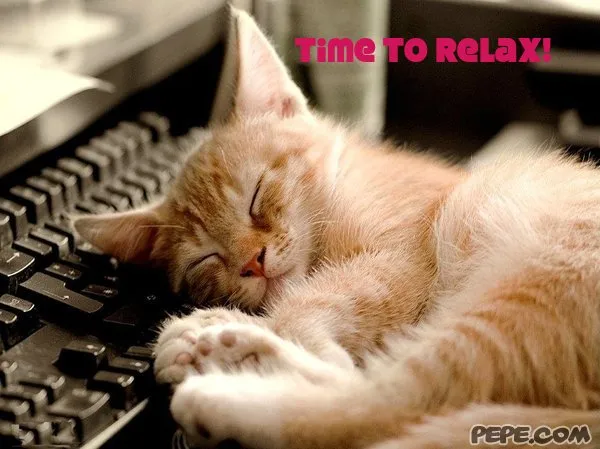
Ok, it's time for a timeout!
We have gone on a little journey today as we found out more about what wallets are and how to be safe online with some good practices to take home.
I wanted to keep it at a high level so that you at least have something to prepare yourself for storing, being safe and setting up your own cryptocurrency wallets. Of course, do your own research as always to see what works for you and stay safe online folks!
I hope this puts you in good stead to understand a bit more about how wallets work!
In the next section, I'll be going through how to buy Bitcoin and how exchanges work (from a UK point of view).
Now though, it's your turn.
Did you enjoy the article or find it useful?
I'd love to hear from you and if you learnt something new, feel inspired to do some of your own research or felt I didn't cover something well enough, let me know and when I finalise the pdf, I'll make it right!
For now though, take it easy and catch you soon!
Nicky
Contents
The history and technology of Bitcoin
2.1 How and why did Bitcoin come in to existence?
2.2 How does Bitcoin & blockchain actually work (Part 1)?
2.3 How does Bitcoin & Blockchain actually work (Part 2)?Buying Bitcoin
3.1 Being secure with cryptocurrency & wallets (you are here)
3.2 What are exchanges?
3.3 Where can I buy cryptocurrency?
3.4 How to store cryptocurrencies?Definitions of common phrases
Portfolio Management
Cryptocurrency News Outlets
Fluctuations in price
Blockchain Platforms for Musicians & Music Fans
8.1 Atom Collector Records
8.2 Musicoin
8.3 Channels
8.4 Steemit
8.5 Sola
8.6 Minds
8.7 Choon
8.8 InmusikConcluding thoughts
